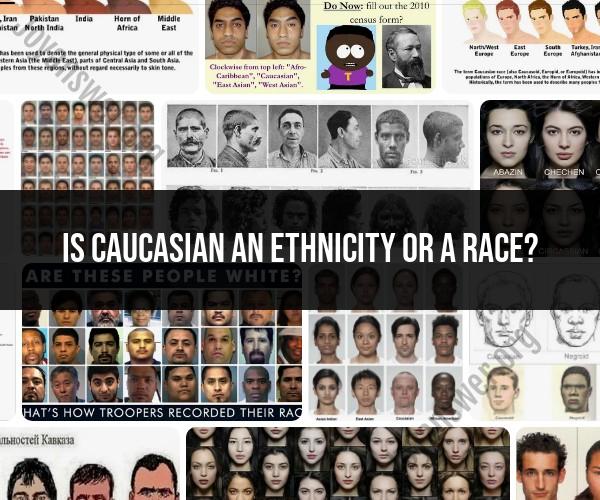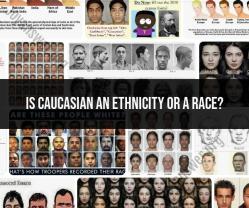Is Caucasian an ethnicity or a race?
The term "Caucasian" has been historically used in different ways, and its usage can be somewhat confusing. It's important to note that the classification of "Caucasian" as a race or ethnicity has evolved and is not universally accepted. Here's an explanation of its historical usage:
Historical Usage as a Race:In the 18th and 19th centuries, the term "Caucasian" was often used as a racial classification to describe one of the primary racial groups, alongside Mongoloid, Negroid, and other categories. This classification was based on the belief that the Caucasian race originated from the Caucasus region, which includes parts of Eastern Europe and Western Asia. This racial classification was based on physical characteristics such as skin color, hair type, and facial features.
Contemporary Usage as an Ethnicity:In more recent times, the term "Caucasian" is less commonly used as a racial classification and is more often associated with ethnicity. In contemporary language, it is often used to describe people of European, Middle Eastern, or Western Asian descent, regardless of their specific racial background. This broader usage focuses on cultural and geographic heritage rather than racial characteristics.
Issues and Controversy:The concept of race itself is complex and socially constructed, and many scholars and scientists consider it a flawed and outdated way to categorize humanity due to its lack of a solid scientific basis. Instead, the emphasis is increasingly placed on cultural, ethnic, and geographic distinctions.
In practice, the classification of "Caucasian" as either a race or an ethnicity can vary depending on the context, the region, and the cultural norms. However, it's crucial to be aware that racial classifications have been widely discredited by the scientific community, and the emphasis on ethnicity, cultural background, and self-identification is more commonly recognized in modern discussions about human diversity.
Caucasian Identity: Ethnicity or Race?
The term "Caucasian" is often used to describe people of European descent. However, there is no scientific basis for race, and the term "Caucasian" is considered to be a social construct.
Some people identify as Caucasian, while others prefer to identify with their specific ethnicity, such as English, French, or Italian. There is no right or wrong answer, and it is up to each individual to decide how they identify.
Understanding the Complexities of the Term "Caucasian"
The term "Caucasian" has a long and complex history. It was originally used to describe people from the Caucasus region, which is located between Europe and Asia. However, the term was later expanded to include all people of European descent.
In the 19th century, the term "Caucasian" was used to justify the belief that white people were superior to other races. This belief was used to justify slavery and colonization.
Today, the term "Caucasian" is still used by some people to describe people of European descent. However, it is important to note that the term is not based on science, and it is considered to be outdated and offensive by many people.
The Historical Development of Caucasian Racial Classification
The idea of race as a biological concept dates back to the 18th century. At the time, scientists believed that there were three distinct races: Caucasian, Negroid, and Mongoloid.
The Caucasian race was believed to be the most superior race, while the Negroid and Mongoloid races were believed to be inferior. This belief was used to justify slavery and colonization.
In the 20th century, scientists began to challenge the idea of race as a biological concept. They found that there is more genetic variation within racial groups than between racial groups.
Today, the scientific consensus is that race is not a biological concept. Race is a social construct, and it is based on physical characteristics such as skin color, hair texture, and facial features.
Debates and Controversies Surrounding the Concept of Race
The concept of race has been the subject of much debate and controversy. Some people believe that race is a real and important concept, while others believe that it is a harmful social construct.
Those who believe that race is a real concept argue that it is important for understanding racism and discrimination. They also argue that race is an important part of people's identity.
Those who believe that race is a harmful social construct argue that it is used to justify racism and discrimination. They also argue that race is not a real biological category.
Modern Perspectives on Ethnicity and Race
Today, many people prefer to identify with their ethnicity rather than their race. Ethnicity is based on shared cultural and historical heritage, while race is based on physical characteristics.
There are many different ethnic groups in the world, and people can identify with multiple ethnic groups. For example, someone could be both Chinese-American and African-American.
The concept of race is complex and controversial. It is important to be aware of the different perspectives on race and to be respectful of people's choices about how they identify.









